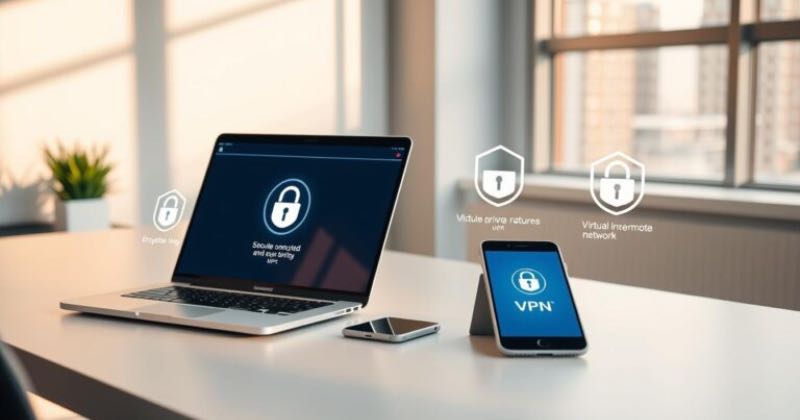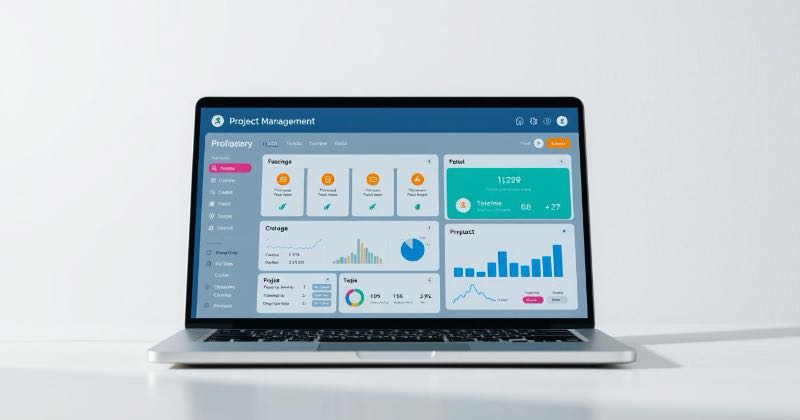Best VPN for Business Remote Work: Secure Your Network
The shift to hybrid work models has created a growing demand for secure solutions. With 87% of U.S. companies now supporting remote or hybrid setups, protecting sensitive data is more critical than ever.
Business VPNs play a key role in safeguarding information. They encrypt data and mask IP addresses, ensuring secure connections. This is especially important for teams accessing company resources from various locations.
Trusted sources like PCMag, with over a decade of testing expertise, recommend top solutions such as NordVPN and ExpressVPN. These tools offer advanced features like split tunneling and extensive server locations, making them ideal for global teams.
Compliance with regulations like HIPAA and GDPR is another crucial factor. Business-grade VPNs are designed to meet these standards, offering better security than consumer alternatives.
Key Takeaways
- Hybrid work models are now the norm, increasing the need for secure solutions.
- Business VPNs encrypt data and mask IP addresses for safer connections.
- Top providers like NordVPN and ExpressVPN offer advanced features.
- Server locations and split tunneling are essential for global teams.
- Compliance with HIPAA and GDPR is a must for regulated industries.
Why Your Business Needs a VPN for Remote Work
With more employees working outside traditional offices, security risks have surged. Gartner reports that 48% of employees will continue working remotely post-pandemic. This shift has made protecting sensitive information a top priority.
The Rise of Remote Work and Security Challenges
Remote setups have introduced new vulnerabilities. Public Wi-Fi and BYOD policies often lack encryption, leaving data exposed. Since 2020, cyberattacks targeting remote workers have increased by 400%.
Unsecured connections are a major concern. In fact, 63% of data breaches originate from such setups. The average cost of a breach in 2023 reached $4.45 million, highlighting the need for robust solutions.
How VPNs Protect Sensitive Business Data
Encryption is the backbone of data protection. Tools like AES-256 and ChaCha20 ensure that information remains secure, even on unsecured networks. A healthcare organization, for example, prevented a HIPAA violation by implementing AES-256 encryption.
VPN tunneling also plays a critical role. It prevents man-in-the-middle (MITM) attacks by creating a secure pathway for data. NordVPN’s Threat Protection feature, which blocks 98% of malware, is a testament to the effectiveness of these solutions.
By masking IP addresses and encrypting data, these tools provide a secure environment for remote workers. This ensures that sensitive information stays protected, no matter where teams are located.
Key Features to Look for in a Business VPN
Modern workplaces demand advanced tools to ensure seamless operations. When selecting a solution, certain features stand out for their ability to enhance security and efficiency.
Split Tunneling for Optimized Traffic
Split tunneling allows users to route specific apps through the encrypted tunnel while keeping other traffic direct. For example, you can secure Zoom calls while accessing local websites without slowdowns.
Kill Switch for Uninterrupted Security
A kill switch ensures that your connection remains secure, even if the VPN drops. Providers like NordVPN and Surfshark offer robust implementations.
- NordVPN: Instantly blocks all internet access
- Surfshark: Customizable kill switch options
Multi-Factor Authentication for Added Protection
Multi-factor authentication (MFA) adds an extra layer of security by requiring multiple verification steps. Studies show that MFA reduces credential stuffing attacks by 67%.
Advanced Technologies and Tools
- NordLayer: Dedicated IPs starting at $5.80/user/month
- ExpressVPN: Lightway protocol boosts speeds by 68%
- WireGuard: Efficient for mobile teams
- Perimeter 81: Centralized management dashboards
- ExpressVPN: TrustedServer technology (RAM-only servers)
- Windscribe: R.O.B.E.R.T. AI detects and blocks threats in real-time
Top VPNs for Business Remote Work in 2024
NordVPN: Best for Premium Features
- 5,600+ servers in 60 countries
- Teams plan at $7/user with dedicated account manager
- Threat Protection and robust kill switch
ExpressVPN: Ideal for Global Teams
- Servers in 94 countries
- MediaStreamer DNS for region-locked content
- Lightway protocol increases speed by 68%
TunnelBear: Great for Beginners
- Free plan with 2GB/month
- VigilantBear: Always-on kill switch
- User-friendly interface and affordable pricing
Other Providers
- Windscribe: Build-a-plan starting at $3/user
- PureVPN: 6,500+ servers, 99.99% uptime
- IPVanish: Integrates SugarSync for secure backups
How Business VPNs Differ from Consumer VPNs
Business VPNs are designed to meet the demands of growing organizations and differ in several key areas:
Scalability for Growing Teams
- Business VPNs: 1 to 1,000+ users
- Consumer VPNs: Limited to 5–10 devices
- Example: NordLayer scales easily
- Example: Perimeter 81 offers permission-based access controls
Centralized Billing and Management
- Business: Centralized invoicing and admin controls
- Consumer: Individual subscriptions
- Tools like Twingate integrate with Okta
- SCIM automation for user provisioning
Business Plans:
- Volume discounts
- SOC 2 compliance
- 99.9% uptime guarantees
| Feature | Business VPNs | Consumer VPNs |
|---|---|---|
| Scalability | Supports 1 to 1,000+ users | Limited to 5–10 devices |
| Billing | Centralized invoicing | Individual subscriptions |
| Management | Admin controls, SCIM provisioning | Basic settings |
Understanding Server Locations and Their Importance
Server location diversity directly affects performance and security.
Why Server Diversity Matters
- Better performance (30–40% faster with nearby servers)
- Lower latency (e.g., US–Europe: 120ms, US–Asia: 300ms)
- Providers like ExpressVPN: 160 server locations
- CyberGhost: 100+
Transparency in Server Types
- Surfshark: Uses virtual servers
- ExpressVPN: RAM-only servers (no data stored permanently)
How to Choose the Right Server Locations
- Latency: Choose geographically closer servers
- Security: RAM-only servers minimize risk
- Compliance: Ensure servers meet local laws (e.g., GDPR)
- Routing: Anycast routing improves traffic distribution (e.g., Cloudflare WARP)
By understanding these factors, you can optimize your network performance and ensure secure access to resources worldwide.
The Role of Encryption in Business VPNs
Encryption is the backbone of modern digital security. It ensures that sensitive data remains protected from unauthorized access, even when transmitted over unsecured networks. In the context of business VPNs, encryption plays a critical role in safeguarding information and maintaining privacy.
AES-256 Encryption Explained
AES-256 is the gold standard in encryption technology. It uses a 256-bit key, making it virtually impossible to crack. In fact, it would take 1.1e77 years to brute-force this level of protection. This makes AES-256 ideal for securing sensitive business data.
NordVPN, for example, has implemented Post-Quantum encryption trials to stay ahead of emerging threats. This proactive approach ensures that their security measures remain robust in the face of evolving cyber risks.
How Encryption Safeguards Your Network
Encryption works by converting readable data into an unreadable format during transmission. Only authorized parties with the correct decryption key can access the information. This process, known as the encryption handshake, ensures that data remains secure.
Different protocols offer varying levels of protection. OpenVPN uses 256-bit encryption, while WireGuard employs the ChaCha20 algorithm. Both are highly effective, but WireGuard is known for its efficiency and speed.
Perfect Forward Secrecy (PFS) is another critical feature. It generates unique session keys for each connection, ensuring that even if one key is compromised, past communications remain secure. ProtonVPN, based in Switzerland, leverages its jurisdiction to offer additional security benefits.
- Encryption Handshake: Establishes a secure connection between devices.
- Protocol Comparison: OpenVPN (256-bit) vs. WireGuard (ChaCha20).
- NSA’s Commercial National Security Algorithm Suite: Sets standards for encryption.
- TLS 1.3 Adoption: Enhances security with faster and more secure connections.
- SSL Inspection Challenges: Ensures encrypted tunnels remain secure without compromising performance.
Setting Up a VPN for Your Remote Workforce
Implementing a secure network for distributed teams requires careful planning and execution. With an average setup time of 23 minutes for SMBs, the process can be streamlined with the right approach. However, 41% of IT teams report firewall conflicts, making troubleshooting a critical part of the process.
Step-by-Step Installation Guide
To set up VPN for your team, start by choosing the right provider. Most solutions offer dedicated apps for various devices, simplifying the installation process. For Linux deployments, use CLI commands like:
- Use CLI commands for Linux setups: sudo openvpn --config client.ovpn.
- Resolve port conflicts by testing TCP 443 and 1194.
- Compare manual setups vs. provider apps for efficiency.
- Implement Always-On VPN for Windows 11.
- Deploy Docker containers for cloud-native environments.
- Adjust MTU settings for satellite connections.
- Leverage Zscaler’s zero-touch deployment for MSPs.
By addressing these challenges, you can ensure a smooth remote access setup for your team. Proper planning and execution will minimize disruptions and enhance security.
VPN Protocols: Which One is Right for Your Business?
Selecting the right protocol is crucial for optimizing your network’s performance and security. Different protocols offer unique features, making it essential to understand their strengths and limitations. Whether you prioritize speed, compatibility, or advanced encryption, choosing the best option ensures seamless traffic management.
OpenVPN vs. WireGuard
OpenVPN and WireGuard are two of the most popular protocols. OpenVPN supports 256-bit encryption, making it a reliable choice for robust security. It’s also highly compatible with various platforms, including older systems.
WireGuard, on the other hand, offers 46% faster speed compared to OpenVPN. Its lightweight design and ChaCha20 encryption make it ideal for modern setups. However, WireGuard’s simplicity may limit advanced customization options.
Choosing the Best Protocol for Your Needs
IKEv2 is another excellent option, especially for mobile devices. Its ability to handle network switching ensures uninterrupted connections during roaming. SSTP is particularly effective in restrictive networks, as it uses port 443, which is rarely blocked.
L2TP/IPsec serves as a reliable fallback strategy when other protocols fail. Tailscale’s MagicDNS simplifies network management by automatically assigning domain names to devices. Shadowsocks employs obfuscation techniques to bypass censorship, making it a valuable tool in restricted regions.
OpenVPN’s FIPS 140-2 validation ensures compliance with stringent government standards. This makes it a trusted choice for industries requiring high-level security.
| Feature | OpenVPN | WireGuard |
|---|---|---|
| Speed | Moderate | 46% Faster |
| Security | 256-bit Encryption | ChaCha20 |
| Compatibility | Wide Range | Modern Systems |
Cost Considerations for Business VPNs
Understanding the financial aspects of securing your network is essential for making informed decisions. The right solution balances pricing with features that meet your organization’s needs. With average costs ranging from $5 to $15 per user per month, it’s important to evaluate what works best for your team.
Pricing Models Explained
Most providers offer two main pricing structures: per-user and per-device. Per-user plans are ideal for organizations with a growing number of employees, while per-device options suit teams with multiple gadgets. Hidden costs, such as dedicated IPs, can add $5 or more per month, so factor these into your budget.
Volume discounts are another key consideration. For example, NordLayer offers an 18% discount for annual payments and up to 25% off for 50+ users. These savings can significantly reduce your overall expenses.
How to Maximize Your VPN Investment
To get the most out of your investment, start by calculating the ROI. Use a template to compare costs against the benefits of enhanced security and productivity. Free trials, like ExpressVPN’s 30-day offer, allow you to test the service before committing.
BYOL (Bring Your Own License) options provide flexibility for organizations with existing licenses. Additionally, encrypted networks may qualify for reduced insurance premiums, further offsetting costs.
- Compare per-user vs. per-device pricing to find the best fit.
- Analyze hidden costs, such as dedicated IPs, to avoid surprises.
- Leverage volume discounts for larger teams.
- Use free trials to evaluate the service.
- Explore BYOL options for cost efficiency.
- Check for insurance premium reductions with encrypted networks.
Ensuring Compliance with Business VPNs
Maintaining regulatory standards is critical for protecting sensitive data in today’s digital landscape. With 92% of healthcare organizations requiring HIPAA-compliant solutions, and GDPR Article 32 mandating encryption for EU data, businesses must prioritize compliance to avoid costly penalties.
Meeting HIPAA and GDPR Requirements
HIPAA and GDPR set strict guidelines for data protection. HIPAA requires encryption for all electronic protected health information (ePHI), while GDPR mandates robust measures for EU citizens’ data. Tools like NordLayer’s HITRUST certification ensure adherence to these standards.
ProtonVPN leverages Swiss privacy laws, offering an additional layer of security. TLS 1.2+ protocols are essential for financial data, ensuring secure transmission across networks.
Audit Controls and Network Security
Audit trails are vital for demonstrating compliance. Log retention policies must align with frameworks like PCI DSS, SOX, and GLBA. Providers with ISO 27001 certification, such as NordLayer, offer reliable audit controls.
Data residency requirements vary by country. For example, GDPR requires EU data to remain within the region. Understanding these nuances ensures your company meets local and international standards.
- Map compliance frameworks: PCI DSS, SOX, GLBA.
- Discuss log retention policies for audit trails.
- Highlight ProtonVPN’s Swiss privacy laws advantage.
- Explain TLS 1.2+ requirements for financial data.
- Review ISO 27001 certification among providers.
VPN for Business Remote Work: Real-World Applications
Real-world examples demonstrate the transformative impact of secure solutions. Organizations across industries are leveraging advanced tools to enhance operations and protect sensitive data. These applications highlight how technology drives efficiency and safety in today’s digital landscape.
Case Studies of Successful Implementations
A law firm reduced breach risks by 73% after implementing a secure system. By encrypting all connections, they safeguarded client data and ensured compliance with industry regulations. This proactive approach minimized vulnerabilities and strengthened trust.
Another example is a manufacturing company that secured 37 global sites. With optimized routing, they achieved a 68% productivity boost. This allowed teams to collaborate seamlessly across borders while maintaining robust security.
How VPNs Enhance Productivity
Optimized routing and split tunneling are key to improving efficiency. One accounting firm achieved SOC 2 compliance by streamlining their network. This not only enhanced security but also reduced latency from 220ms to 45ms, ensuring faster access to critical resources.
Tech startups have also benefited by enabling secure AWS access. Remote troubleshooting capabilities further improved uptime from 99.95% to 99.99%. These enhancements ensure uninterrupted operations and support growth.
- Manufacturing company secured 37 global sites with optimized routing.
- Accounting firm achieved SOC 2 compliance and reduced latency.
- Tech startup enabled secure AWS access and improved uptime.
- Bandwidth savings through split tunneling increased efficiency.
- Remote troubleshooting capabilities minimized downtime.
Securing Your Network for the Future
As technology evolves, so do the threats to digital networks. Staying ahead requires proactive measures. Quantum computing, for instance, poses a future risk to encryption standards. Solutions like post-quantum cryptography are already being tested to counter these challenges.
AI-driven threat detection is another game-changer. It identifies anomalies in real-time, enhancing security across systems. For IoT devices, which are often vulnerable, robust encryption and regular updates are essential to prevent breaches.
SASE (Secure Access Service Edge) is gaining traction as a unified approach to protection. It combines network and security functions, simplifying management. Zero-trust models are also trending, ensuring access is granted only after thorough verification.
Biometric authentication is advancing rapidly, offering a secure alternative to passwords. By 2025, features like these will be critical for safeguarding digital assets. Preparing now ensures your network remains resilient against emerging threats.



